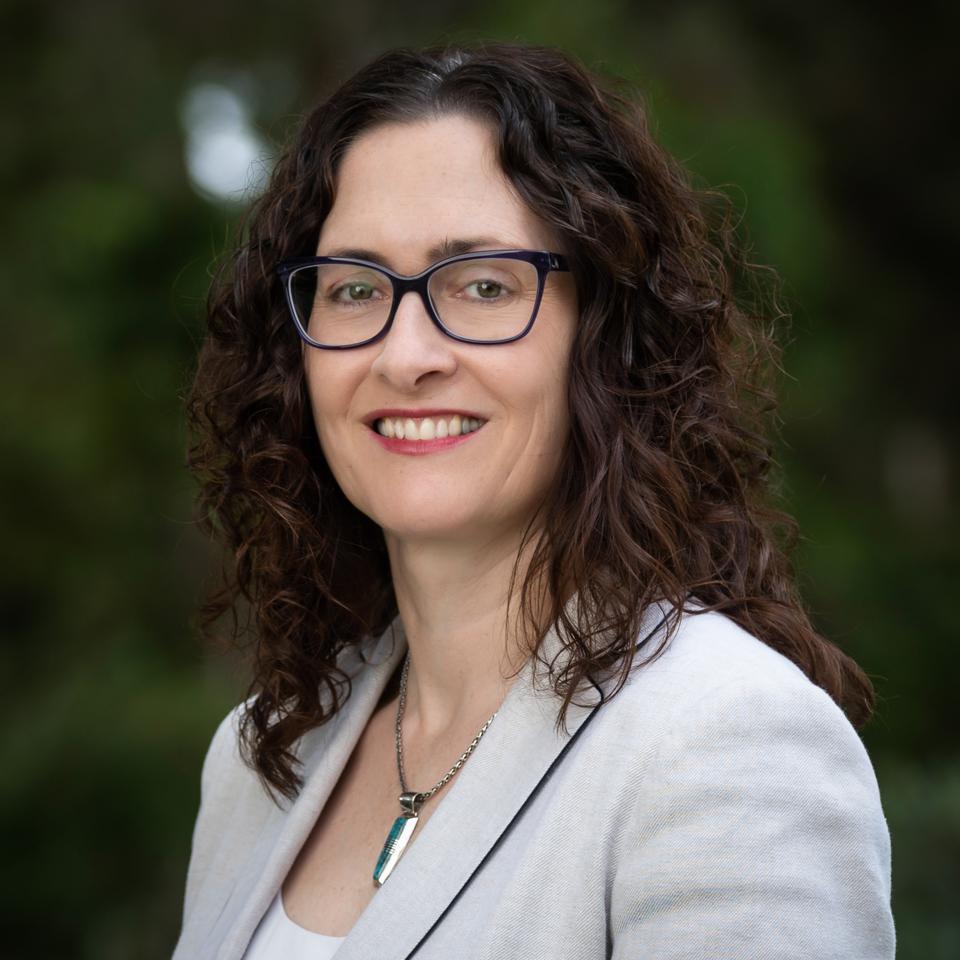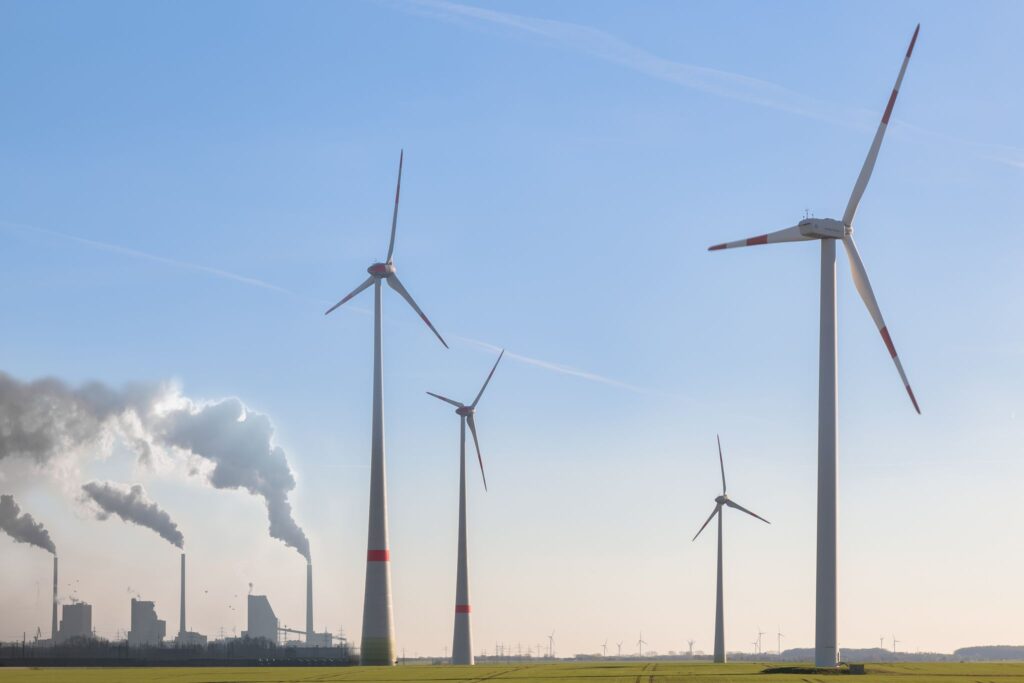Amy O’Brien is the Global Head of Responsible Investing at Nuveen, a TIAA Company, the $1.1 trillion global investment manager. Amy and I go way back. Recently we had a call just to catch up on things and to talk about how politicized ESG has become in the U.S. As she was reflecting on the challenges this presented to her, I asked if she’d be willing to do an interview with me. I told her that it would be good to bring some investor reality to the political and values-based demands being made on both the left and the right. She kindly agreed to do so.

Amy O’ Brien, Global Head of Responsible Investing at Nuveen © COPYRIGHT MATT KOSTERMAN
Eccles: Amy, thanks for taking the time to talk with me. I’ve never asked you about your childhood. Mind telling me a bit about it?
O’Brien: I was raised on a family apple orchard and cider mill in a small town in southern New England. I’m the middle of three siblings. My parents were very involved in the local community. My four grandparents lived in the same town, along with many other extended family members. I was particularly close to my grandmothers, part of the “Greatest Generation,” and they both had a lot of influence on me growing up.
Eccles: Where did you decide to go to college and why? What did you study?
O’Brien: My undergraduate degree, in biology, is from Boston College. My father was part of the class of 1965. As my family’s token “math and science” kid, in high school I was always attracted to engineering and medicine as possible areas of study. My initial plan was to go to medical school.
Eccles: I live in the Boston area, so I know BC well and that it’s a Jesuit college. Is it fair to assume you’re a practicing Catholic?
O’Brien: Yes, I am. That background, which includes attending parochial high school, impacted my decision to attend BC and pursue a mission-driven career. BC’s educational philosophy is grounded in intellectual rigor, being challenged to do and be more, thinking of people and problems beyond yourself, and using your talents to address the world’s greatest needs. It significantly shaped my career trajectory. In college I became increasingly involved in topics related to sustainability both within and outside the classroom.
Eccles: What was your first job out of college and what did you do?
O’Brien: For several years after graduation I was part of a research team at Brigham and Women’s Hospital in Boston studying how to alleviate negative side effects of chemotherapy treatment. During that time, I continued to explore options for sustainability-focused careers and graduate school programs. A few years later, I enrolled at Rensselaer Polytechnic Institute.
Eccles: What did you study there?
O’Brien: I received a M.S. in Environmental Management & Policy in 1996. RPI’s program had a multi-disciplinary approach, with a combined focus on science, business, law and civil society. Through a graduate school internship at the Council on Economic Priorities (CEP) in New York City, I first discovered the world of corporate social responsibility (CSR) research. Long before the term “ESG” was coined, consumers and investors had begun to use CSR information to make purchasing and portfolio decisions.
Eccles: When did you join Nuveen and in what role?
O’Brien: I joined TIAA’s asset management group in 2005 as a director of global social and community investing, a newly created Subject Matter Expert role. I focused on enhancing and building out our “branded” products—the—first of which, the CREF Social Choice Account, had been launched in 1990—stakeholder engagement, including our boards of trustees, and updating the vision and strategy for our General Account’s community—later relabeled as “impact”—investing portfolio. My role and team mandate significantly expanded over time, as TIAA acquired Nuveen and several alternative asset managers. Today Nuveen, TIAA’s investment manager, offers outcome-focused investment solutions designed to secure the long-term financial goals of institutional and individual investors.
Eccles: When and how did you take on your current role?
O’Brien: In 2017, through a newly created position. It illustrates how we have continuously evolved our strategy and operating model across the platform as investment and client needs rapidly evolved.
Eccles: Please tell me about your responsibilities and current topics of focus.
O’Brien: Our team’s role and work all fall under the umbrella of enhancing investment performance and collaborating with clients on their ESG objectives for their portfolios. Our partnerships with Nuveen’s investment teams across asset classes include ESG integration, stewardship—for example, proxy voting and portfolio company engagement—and impact measurement and management. We are also working on data, reporting, advice, product and partnership initiatives with our clients and across the industry.
Climate is a major theme across the platform. Record market growth recently has converged with unprecedented regulatory activity. All this attention on responsible investing has generated increased scrutiny from many stakeholders and intensified debates on the role that investors should—or shouldn’t—be playing.
Eccles: I’m not a big fan of divestment and I think that we’ll need fossil fuels, obviously less and less, in coming decades. How does Nuveen think about the energy transition?

Fossil fuel (coal) power station and wind turbines in the Eemshaven generating power. Energy transition concept. (Photo: iStock)
O’Brien: We need to widen the lens. The world is now profoundly altering the ways in which it generates and uses energy. “To divest or not to divest” isn’t even the right question; it fails to capture the many, complex considerations and choices facing asset managers and investors in the energy sector. The right question is “What does it mean today to invest in energy in a responsible manner, serving the best interest of both investors and the world at large?”
We believe that ownership is a potent lever for redirecting and guiding existing assets toward better outcomes, financial and societal, for our investors. Through our engagement initiatives we are helping companies mitigate conditions like over-reliance on fossil fuels that, left unmanaged, can impair operations and damage financial results over time. As one example, our Climate Risk 2.0 stewardship initiative is driving transparency, accountability and impact among 100 companies with significant climate-related financial risk, comprising the majority of our public markets-financed emissions.
We’re also developing new investment capabilities representing the best emerging solutions to the climate change crisis. As examples, we recently acquired Glennmont Partners, one of Europe’s largest renewables fund managers, to enhance our existing private infrastructure platform. We acquired Greenworks Lending (now Nuveen Green Capital) to build on our footprint in clean energy and energy efficiency lending. We also manage the TIAA-CREF Green Bond Fund, which invests in bonds demonstrating direct and measurable environmental impact.
According to McKinsey, transforming the global economy to achieve net-zero carbon by 2050 will require more than $9 trillion in annual average spending on physical assets. This will create extraordinary commercial and investment opportunities.
Assets that are resilient in the face of change will be winners. Responsible energy investment is all about giving investors better access to likely winners.
Eccles: Since you’re still invested in fossil fuel companies and have their bonds, what kind of response are you getting from the divestment crowd—including both clients and NGOs?
O’Brien: We intend to remain focused on responsible energy investing, our engagement techniques, our proxy voting practices, and maintaining an active role in the green energy transition. Developing the right solution demands a multi-stakeholder approach, so we are working with policy makers, regulators, NGOs, and industry groups, as well as companies and investors, on all the relevant issues.
Many individual investors agree that investment managers need to play this role. In Nuveen’s most recent Responsible Investing Survey, three quarters of investors said that more needs to be done by firms managing money to encourage companies to address their societal risks and opportunities.
By better positioning assets to survive and thrive in a changing world – and delivering investor capital to the likely “winners” of the low-carbon transition – responsible energy investment can yield returns and positive social impact.

Cambridge, MA, USA – November 2, 2013: Harvard Yard, old heart of Harvard University campus, on a beautiful Fall day in Cambridge, MA, USA on November 2, 2013. (Photo: iStock)
Eccles: Some major academic institutions have been in the forefront of the divestment movement—as illustrated by Harvard University’s decision to phase out its fossil fuel investments. And lately, some TIAA plan participants have proposed that TIAA take similar action. How have you responded?
O’Brien: Our clients have a range of views regarding how to invest in energy assets in the course of the low-carbon transition. We offer asset choices that reflect those views. Our view is that broad divestment from fossil fuels is not the best means to produce long-term value for our investors and other stakeholders—nor does it offer us an optimal way to influence the policies and practices of issuers we invest in. Large-scale divestments by simply selling fossil-fuel-generating investments to other companies can have unintended consequences and may even increase carbon output.
For example, if you sell a company that is broken into pieces or goes private you have no transparency and may be bought to optimize production of fossil fuels. We are very focused on developing overall solutions for our clients and that includes a holistic approach to the global energy transition currently underway. Among other tactics, that involves engaging directly with management of portfolio companies to drive positive change in their environmental policies. We cannot take that kind of action if we aren’t invested.
Eccles: The climate issue also comes up in proxy voting. How are you approaching that and what kind of response are you getting?
O’Brien: Our approach to proxy voting is always case-by-case, grounded in identifying material, long-term investment risks and opportunities, and assessing company and industry factors related to those issues. In terms of climate issues in proxy votes, the “how” of assessing company transparency and strategy regarding associated risks hasn’t changed. We describe our proxy voting in depth in our Annual Stewardship Report.
Eccles: What I’m hearing is that you are getting pressure from people who don’t think you’re doing enough to address climate change. What is your fiduciary duty as seen from the perspective of both asset owner and asset manager?
O’Brien: TIAA is the leading retirement services provider for those in academic, research, medical, and cultural fields. As part of this role, TIAA guarantees lifetime income to participants to and through retirement, backed by the TIAA General Account. The General Account is committed to achieving net-zero carbon emissions by 2050, because we believe that climate risk is an investment risk that must be managed in the long term to protect and promote our participants’ best interests. The process of setting and being fully committed to implementing this target involves numerous teams across our company. But, again, this doesn’t mean that our key lever of change is blunt or broad based divestment from fossil fuels. We intend to achieve our net-zero goals over time through new investments aligned with and reflecting the global transition to a lower-carbon economy.

The proxy vote business letter with a pen resting on the document ready to authorize the governing members. Proxy vote by mail, a common business document sent to all participating business interested party and stakeholders. (Photo: iStock)
Eccles: There’s discussion about letting the ultimate client vote their proxy. Are you thinking about doing this?
O’Brien: We’re continuing to carefully assess the whole issue of pass-through voting, including identifying how to comply with regulation as well as examining what clients might ultimately want on this front.
Eccles: Proxy voting is just one aspect of stewardship. What is your view on your responsibility here and what are you doing?
O’Brien: Our approach to stewardship is predicated on our fiduciary duty to our clients and is designed to gain investment-relevant information and meaningfully advance ESG transparency, accountability and, where appropriate, real-world impact among issuers across our portfolios. We know that managing risks and opportunities is not a “one size fits all” exercise, nor is every issue material to every company. Therefore, we combine deep, security-specific ESG research, case-by-case voting and engagement with systematic processes and defined, proprietary evaluation frameworks and standards. We want to actively manage our investments to promote risk mitigation and long-term value creation using an ESG lens.
Eccles: The focus of stewardship is listed companies, but you own a lot of real assets as well, like real estate and farmland. What are your holdings in these asset classes?
O’Brien: Nuveen Real Estate, one of the world’s largest investment managers, is committed to making its global property portfolio of $154 billion in AUM operationally net zero carbon by 2040. As one approach, we have a comprehensive global real estate impact investing sector focused on enriching the lives of residents and addressing critical real estate sustainability concerns of inequality and climate change.
Nuveen is also the largest manager of farmland assets globally. Nuveen Natural Capital, our land-based platform, including timberland and farmland, consists of $9.4 billion in AUM and 3 million acres across 600 properties in 10 countries. The platform delivers investment solutions designed to protect and enhance nature, climate and people, while at the same time maximizing returns.
Eccles: How important do you think climate change is to the long-term value creating potential of these asset classes?
O’Brien: Assets that are resilient in the face of change, or even an agent of its progress, will be winners. As one example, Nuveen Real Estate is improving the efficiency of our existing buildings portfolio, while also developing and acquiring buildings that are performing ahead of industry benchmarks on energy efficiency. Our annual Nuveen Real Estate ESG Report provides a very detailed look at such initiatives.
Nuveen Natural Capital is advancing best practices and helping to create sustainable production systems for food, fiber, and timber. We aim to produce natural capital balance sheets across the portfolio that, among other goals, will value the programs already in place to conserve or restore native vegetation and forests, and incentivize more of these programs by treating them more as natural capital balance sheet investments. Our Nuveen Natural Capital 2022 Sustainability Report provides details.

Vector illustration of a red and blue election United States map. (Photo: iStock)
Eccles: No discussion about climate change would be complete without addressing the many and growing number of red state initiatives focused on asset managers. Has Nuveen been feeling any pressure here?
O’Brien: Like any asset manager doing business in the U.S., we believe it’s important to have conversations on all sides of the discussion. But we always make clear that, first and foremost, we act as fiduciaries to our clients and their assets. Clients’ best interests drive how we make climate change decisions, and all other investment decisions, for our portfolios.
Because we believe that climate risk is an investment risk, we are obligated as fiduciaries to manage climate risk on our clients’ behalf—in all the ways that I have described—and help safeguard their long-term financial interests.
We believe there are investment opportunities as well associated with ESG factors such as climate risk, so investing responsibly in the energy sector –indeed investing responsibly overall—is also about identifying these opportunities to maximize returns for our clients.
Eccles: How is Nuveen trying to navigate these conflicting pressures due to groups with different values, different ideologies, and different government policies and regulatory regimes?
O’Brien: In this era of polarization and massive simplification of complex issues, investment managers have to be precise with clients about their approach, including what they will and will not do. We also have to be clear about how broader societal and environmental challenges cannot—and should not—be solved by investment managers alone. Now is a good time to go back to constructive engagement among key stakeholders—government policymakers, nongovernmental organizations, all representatives of civil society and citizens themselves.
Eccles: Do you think things will be clearer or even more opaque and conflict-ridden five years from now?
O’Brien: I hope that current headlines will ultimately give way to better understanding of responsible investing and how it seeks to maximize investors’ outcomes. I hope too that, through additional regulatory standardization and transparency required by public companies and asset managers, conversations will become more sophisticated and objective, and less personal.
Eccles: Thanks again for your time. Looking forward to seeing you the next time I’m in New York!
O’Brien: Thank you for the opportunity and I’m looking forward to seeing you soon too!
SUBSCRIBE TO OUR NEWSLETTER
Subscribe our newsletter to receive the latest news, articles and exclusive podcasts every week

